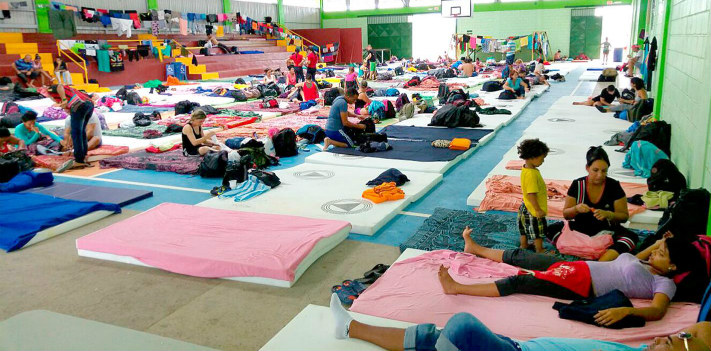
EspañolCosta Rica is urging neighboring nations to find a solution to the Cuban migrant crisis before it spirals out of control. The Costa Rican government has requested that Panama, Colombia, and Ecuador take the necessary measures to curb the arrival of more Cuban islanders. So far, 6,000 are stranded within Costa Rican territory, since Nicaragua refuses to let them through.
Kathya Rodríguez, director of Costa Rica’s migration authority, said that, as of December 7, the country has awarded 4,874 temporary visas to Cubans seeking to reach the United States by land. The migrants have requested 1,076 additional visas, but Rodríguez says the government will only grant them when more shelters become available. The temporary housing where Cuban migrants are currently staying in the country has already cost Costa Rica over CR$120 million (US$222,000).
Furthermore, the shelters are quickly running out of room to take in incoming migrants. “We have already set up 26 shelters, and our capabilities are very limited. We won’t have the resources to care for them. Migration has to stop for their own good, and for those already in Costa Rica,” Foreign Minister Manuel González said on Tuesday after learning that Belize had refused a request to fly the stranded Cubans to Belmopán so they could continue their journey.
While Costa Rican authorities negotiate with the Belizean government to allow the passage of at least 5,000 Cubans, they are also in talks with the government of Guatemala, which has said it is willing to receive the migrants and offer them a temporary 15-day visa, so they can proceed to the Mexican border.
Nevertheless, the Guatemalan government has set two conditions: that Mexico formally commits to accepting the migrants, and that someone else pays for the whole operation.
Guatemala’s Foreign Minister Carlos Raúl Morales has said that his government is open to working on solutions, but it needs guarantees. “Our priorities are Guatemalans and preventing more problems in Guatemala,” he said.
Morales argues that the Guatemalan government cannot run the risk of Cubans getting stranded again in their territory. “I have [a large] enough irregular migrant population waiting at the border, [and] to add 4,000 or 5,000 more people … it would be irresponsible, and I would be violating Guatemalan law,” he said.
He also said that the Guatemalan government cannot foot the bill resulting from flying thousands of Cubans from La Aurora International Airport to the Mexican border, besides the food, security, and other accommodations that would be needed.
“There are costs. You can’t just send them over and say, ‘here they go.’ The whole world knows we are going through a revenue crisis,” the minister explained.
Disappointment
On December 9, Costa Rican President Guillermo Solís addressed the Cuban migrants on national television. He said he was disappointed with Guatemala’s and Belize’s refusal to lend the necessary support to help them reach their destination.
The president said that since the beginning of the humanitarian crisis, his government has done everything it can to ensure that Cuban migrants can live under proper conditions.
[adrotate group=”8″]
Solís said he would not deport any migrants back to Cuba, unless they wanted to return to the island. He then asked Cubans who are currently trying to reach Costa Rica to not continue their journey until a solution is reached.
International Solidarity
On December 8, the Inter-American Commission on Human Rights (IACHR) released a statement expressing its deep concern over the Cubans stuck in Costa Rica.
Irregular migration exposes individuals to extreme danger, said the multilateral body. The IACHR requested that the Nicaraguan government investigate the accusations that army officials attacked Cubans as they tried to cross the border, and urged the governments of the region, including the United States, to respect the migrants’ human rights.
Meanwhile, the Red Cross, the community of Cuban exiles in Miami, and several US companies are raising funds to support the migrants waiting in Costa Rica. On Friday, December 11, a delegation will travel to Costa Rica to meet the local Red Cross representative and hand over the money.
 Versión Español
Versión Español












